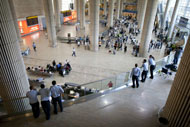
The Palestinians are used to taking to the streets in protest. It is nothing new for them to burn tires, close streets, call general strikes or raise slogans calling for an end to something or the removal of someone. But unlike the protests of the past, this newest crisis in Palestine over the price of fuel and bread really is new and uncharted terrain. And perhaps that is why it is just a little misguided.
This week’s economic protests over the hike in commodity prices could be seen in the context of the global outrage over similar issues. If the protests are taken in this framework, the calls for Prime Minister Salam Fayyad to step down and the public outrage against the government seem perfectly appropriate. But the fact of the matter is that Palestine is not Greece, or Italy or Germany and its government is neither sovereign nor independent. Having said that, it is only fair to cast blame where it is due. Yes, the Palestinians may have an issue of mismanagement; yes, at least some of the claims of corruption in the higher echelons of the Palestinian Authority may be true and yes, we have definitely made mistakes along the way, economic and otherwise. But, there is a truth that trumps all others and that is the reality of the Israeli occupation.
It cannot be that all of those demonstrating have forgotten the ultimate control Israel has over our lives. The entry and exit of goods at Israeli-controlled borders is determined by agreements such as the Paris Protocol, the economic appendix to the Accords. In fact, this protocol, which President Mahmoud Abbas is now demanding to be amended, has hindered any real economic growth in Palestine ever since it was signed in 1994. Israel collects tax revenues on behalf of the PA and then uses them as leverage to pressure the leadership to bend to its will. It has complete control over 60 percent of the West Bank which is designated as Area C, meaning that an essentially farming population that depends on agricultural land to survive, has been cut off from this source of livelihood by way of Israel’s wall, checkpoints and other restrictions.
And since the same value added tax in Israel is applied to the Palestinians (another big mess), any rise in prices in Israel is directly reflected on the rise in prices in Palestine and on the Palestinians’ ability to lower prices on their own. What’s more, while the protocol stipulated that Palestinian and Israeli markets be opened to each other, this has only happened in one direction. Israeli products flood the Palestinian market, sinking the Palestinians deeper and deeper into economic dependency on Israel. Palestinian products, on the other hand are not on Israeli shelves, making the growth one-way.
The list goes on of course and the picture becomes clearer as we speak. Israel is ultimately to blame for the stymying of the Palestinian economy and for the continuation of an occupation that should have ended years ago (according to the infamous Oslo Accords).
But again, Israel cannot take the blame fully. The Palestinians are right to demand better management of finances from their government and address charges of corruption within its ranks. While it is true that Arab and international donor countries have not lived up to their promises and commitments in supporting the Palestinians, this very setup is what got the Palestinians into hot water in the first place. How can any economy thrive when it is so dependent on foreign aid and is shackled to a military occupation that is hell-bent on keeping it subordinate? The answer is that it cannot.
This of course, begs the question to why did the Palestinians signed the Paris Protocol – and the Oslo Accords for that matter – in the first place? The truth is, as restricted as the Paris Protocol seemed for the Palestinians back then, it is far worse now, what with Israel’s lack of implementation in so many aspects. Israel has no right to withhold funds from the PA or hold goods at seaports for months and then make the Palestinians pay holding costs. The “transitional” stage stipulated in the Oslo Accords was ostensibly to end in 1999 and with it its adjunct agreements. Of course that did not happen, so now we have outdated and frankly, invalid agreements governing Palestinian affairs.
So, the problem is manifold. The PA should take stock of its internal affairs and manage its finances better, but without an end to the Israeli occupation and these horrible agreements that have shackled the Palestinians hand and foot, no removal of Salam Fayyad or even President Abbas will solve the problem.
Joharah Baker is a Writer for the Media and Information Department at the Palestinian Initiative for the Promotion of Global Dialogue and Democracy (MIFTAH). She can be contacted at [email protected].









